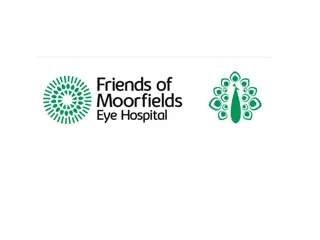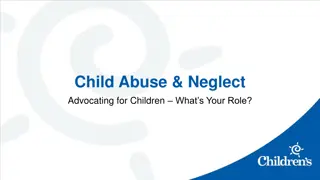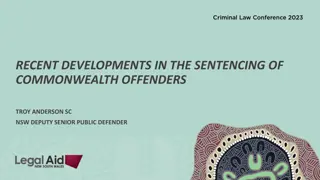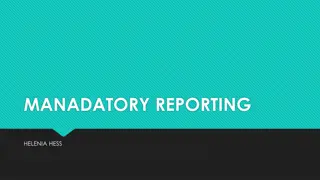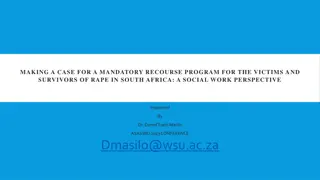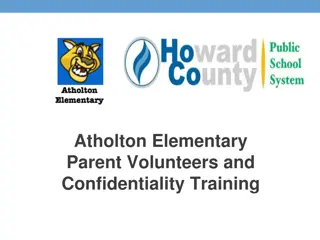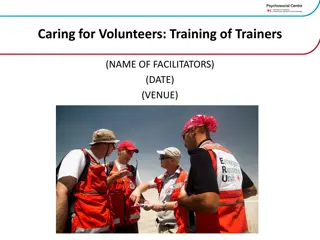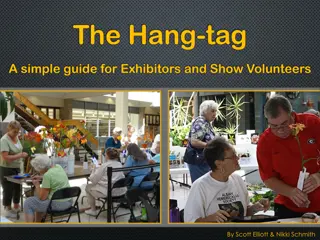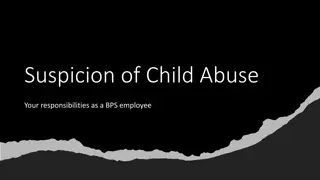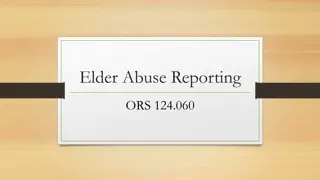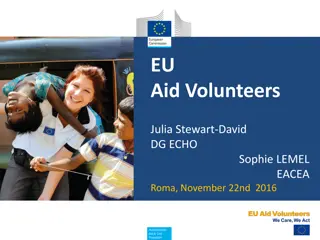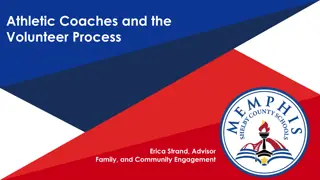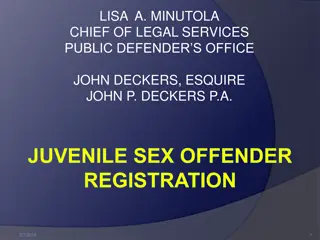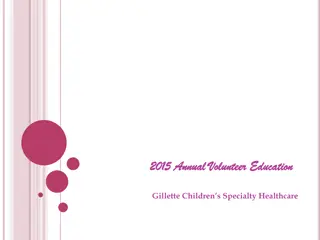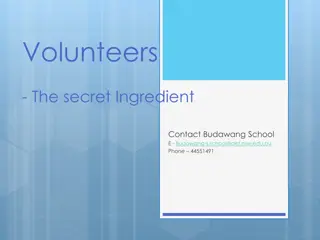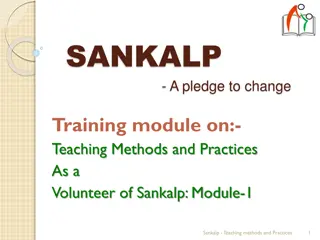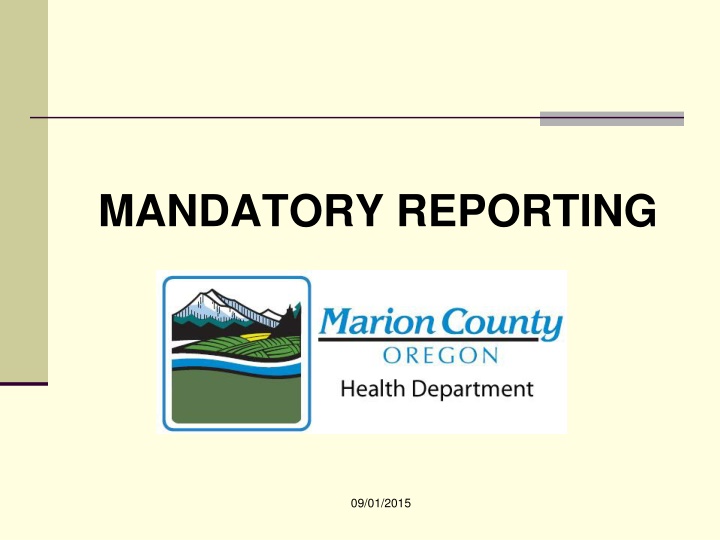
Mandatory Reporting for Vulnerable Populations in Oregon
Explore the guidelines and responsibilities of mandatory reporting in Oregon for safeguarding mentally ill individuals, developmentally disabled persons, seniors, and children. Learn about the definitions of abuse, reporting procedures, and the importance of timely action to protect vulnerable populations from harm.
Download Presentation

Please find below an Image/Link to download the presentation.
The content on the website is provided AS IS for your information and personal use only. It may not be sold, licensed, or shared on other websites without obtaining consent from the author. If you encounter any issues during the download, it is possible that the publisher has removed the file from their server.
You are allowed to download the files provided on this website for personal or commercial use, subject to the condition that they are used lawfully. All files are the property of their respective owners.
The content on the website is provided AS IS for your information and personal use only. It may not be sold, licensed, or shared on other websites without obtaining consent from the author.
E N D
Presentation Transcript
MANDATORY REPORTING 09/01/2015
Purpose of mandatory reports Mandatory reporting is intended to protect those who cannot protect themselves. Mentally Ill persons (ORS 430.765) Developmentally Disabled persons (ORS 430.765) Seniors (ORS 124.005-124.040) Children (ORS 419B.005-419B.017) Adult patients with non-accidental injuries (ORS 146.750 2012) Applies to RN, LPN, MD
Mandatory Reporting All Marion County Health Department staff (paid & non-paid) are mandatory reporters by Oregon Law You must make a report if while in your official capacity, you come into contact with an adult (or abuser of person) who is mentally ill, or developmentally disabled and you reasonably believe abuse has occurred You must make mandatory report if you examine a patient with non- accidental, serious physical injury or injury caused by a weapon Mandatory reporting for children and seniors (65 or older) is a 24-7 responsibility A report is a request for assessment into the safety and condition of a vulnerable person based on a reasonable concern Failure to report may be subject to prosecution and possible fine
Definitions of Abuse For Mentally Ill or Developmentally Disabled (18+) Abandonment Physical injury caused by other than accidental means Willful infliction of physical pain or injury Sexual abuse Neglect Verbal abuse Financial exploitation Involuntary seclusion A wrongful use of a physical or chemical restraint An act that constitutes a crime (rape, sodomy, etc.) Any death caused by other than accidental or natural means
Reporting Suspected Abuse Mentally Ill If you, while in your official capacity, suspect abuse of a mental health client (18+): Report the suspected abuse immediately to: MH Abuse Report Line at 503- 763-5711 Your supervisor (if reporting suspected abuse of a MCHD client) AND If a client, document the report in the client record
Definitions of Abuse for Seniors (65) Physical injury by other than accidental means or that does not match explanation Neglect Abandonment Willful infliction of physical pain or injury An act constituting a crime such as rape, sodomy, unlawful sexual penetration, Verbal abuse Non-consensual sexual contact Financial exploitation Involuntary seclusion Wrongful use of a physical or chemical restraint
Reporting Suspected Abuse Seniors and Developmentally Disabled If you, while in your official capacity, suspect abuse of a senior or person with developmental disabilities: Report the suspected abuse immediately to: DD Abuse Report Line at 503-763-5711 Seniors and Persons with Disabilities (Seniors) at 503-304-3400 AND Your supervisor (if reporting suspected abuse of a MCHD client) OR If a client, document the report in the client record
Definitions of Child Abuse (Unmarried under 18) Assault Physical injury which has been caused by other than accidental means Mental injury Rape, sodomy, unlawful sexual penetration and incest Sexual abuse Sexual exploitation Contributing to the sexual delinquency of a minor Allowing, permitting, encouraging or hiring a child to engage in prostitution Negligent treatment or maltreatment Threatened harm Buying or selling a person under 18 years of age Permitting a child to enter or remain in or upon premises where methamphetamines are being manufactured Unlawful exposure to a controlled substance ORS 419B.005-419B.950
Child Abuse Physical Assault Injury which has been caused by other than accidental means Includes injury which doesn t appear to match the explanation provided
Child Abuse Mental Injury Rejecting, abandoning or extensive ridiculing Terrorizing with threats of extreme punishment against child s pets or possessions Ignoring a child over time by refusing to talk or show interest in their daily activities Isolating a child by teaching to avoid social contact beyond parent-child relationship Corrupting by teaching inappropriate aggressive, sexual or substance abuse behavior Exposing child to violence
Child Abuse Sexual When a person uses, or attempts to use, a child for their own sexual gratification Incest Rape Sodomy Unlawful sexual penetration Fondling Voyeurism Sexual harassment ORS 419.B005 C-D; ORS 163
Child Abuse Sexual Exploitation Using children in a sexually explicit way for personal gain Using children in prostitution Using children to create child pornography Allowing, or encouraging child to patronize a prostitute Contributing to the sexual delinquency of a minor, including when the minor s sexual partner is 18 years or older (ORS 163)
Child Abuse Sexual activity of a minor must be reported Under Oregon reporting law, minor may not consent so sexual activity must be reported A report is not a conclusion that abuse has occurred Sexual activity may indicate there is sexual abuse You should disclose any of the following factors for reviewer s consideration: Force was used Drug/alcohol use Power differential Age difference (3+ years) Impaired mentally or emotionally Coercion or intimidation Minor s partner is 18 or older
Child Abuse Neglect Failure to provide: Adequate food, clothing, shelter, Supervision and guidance to protect the child from physical or mental harm Medical, dental or mental health care Exposing a child to illegal activities such as drug sales/manufacturing, theft, parental drug abuse (ORS 163.547) Encouraging a child to use drugs or alcohol
Child Abuse Neglect (continued) Leaving a child alone in a position of authority beyond his ability to handle Each child must be looked at individually to make sure he or she is physically and emotionally able to handle the given responsibility The law does not specify the age at which a child can be left alone. However, a child younger than age 10 cannot be left unattended for such a period of time as may likely endanger the child s health or welfare (ORS 163.545).
Child Abuse Threat Of Harm Putting child in situations that pose a significant risk to their health or welfare For example: Living with, or cared for, by person with prior conviction of child abuse or neglect Living with a person involved in child pornography Caregiver behaviors that may endanger the child (substance abuse, mental health or physical problems)
Child Abuse Threat Of Harm (continued) A report should be made when there is current domestic violence or the alleged abuser has a history of domestic violence; and: There is a reason to believe the child has, or will, intervene in a violent situation The child is likely to be harmed during the violence The alleged abuser is not allowing the adult caregiver and child access to basic needs, impacting their health or safety The alleged abuser has killed, inflicted substantial harm, or is making a believable threat to do so to others, including pets Child is witnessing repeated or serious domestic violence
Child Abuse Selling or Trading Buying, selling, or trading legal or physical custody of a child Does not apply to legitimate adoptions or domestic relations planning (ORS 163.537)
Good Faith Report You do not have to prove that abuse occurred before making a report in good faith You must simply have a reasonable belief that abuse has occurred When in doubt, call the appropriate Child Welfare Agency or Law Enforcement Agency to seek a consultation ORS 419.025
Immunity of Person Making Report In Good Faith (Children) Anyone participating in good faith in the making of a report of child abuse and who has reasonable grounds for the making thereof shall have immunity from any liability, civil or criminal, that might otherwise be incurred or imposed with respect to the making or content of such report. Any such participant shall have the same immunity with respect to participating in any judicial proceeding resulting from such report (ORS 419B.025)
Reporting Suspected Abuse Children If you have reasonable cause to believe that: Any child you come in contact with has suffered abuse, or Any person with whom you have contact with has abused a child Contact is not just physical contact (phone, email, letter) You must make a good faith report immediately to: Oregon Department of Human Services, Child Welfare at 503-378-6704 After hours and/or emergency reports, call law enforcement office or 911 Notify your supervisor (if MCHD client) Document the report in the client record (if MCHD client) Reporting suspected child abuse is a 24/7 hour responsibility!
Non-accidental injuries- Adults (18+) RN s, LPN s, MD s are mandatory reporters Applies if a person examined by you has a non- accidental injury that is: A serious physical injury (risk of death, serious disfigurement, protracted health impairment), or A physical injury caused by a knife, gun or other dangerous weapon ORS 146.750 2012
Reporting Suspected Non- Accidental Injuries In Adults (18+) If you suspect a patient under your care has a non-accidental injury that is serious or caused by a weapon, you must make a verbal report to law enforcement immediately: Within city limits Report to city police Outside city limits Report to Marion Co. Sheriff at (503) 588-5032 Your supervisor (if involves MCHD client) If a client, document the report in the client record In consultation with supervisor, submit a written follow-up report to law enforcement ASAP AND See guidance posted on MCHD Policy & Procedure page for more information http://intra.co.marion.or.us/Dept/HLT/policy.htm ORS 146.750 2012
Contact Numbers for Mandatory Abuse Reporting CHILDREN (Age 0-18) SENIORS (MC Clients 65+) Senior and Disabled Services Division 503-304-3400 or 1-800 846-9165 Oregon Department of Human Services (Child Welfare) 503-378-6704 Mentally Ill (MC Clients 18+) MH Adult Abuse Report Line 503-763-5711 or 503-576-4532 Developmentally Disabled (MC Clients 18+) DD Adult Abuse Report Line 503-763-5711 or 503-576-4532 Non-Accidental Injury (MC Patients/Clients 18+) Mandatory Reporting Responsibility Children 24/7 Mentally Ill, Seniors, Developmentally Disabled, Non-Accidental Injuries When in official capacity Call City Police or for Rural Areas call MC Sheriff 503-588-5032
Conclusion This Mandatory Reporting training was updated and reviewed by the Marion County Legal Department in October 2013. If you have questions about information presented in this training, or need clarification of your mandatory reporting responsibilities, please contact your supervisor.
References What you can do about child abuse , DHS 9061. Oregon Dept of Human Services. Revised 10/2012 https://apps.state.or.us/Forms/Served/de9061.pdf
Quiz time You have completed Mandatory Reporting Training. To complete this training and receive credit, you must pass the quiz with 100%. Please click here and then click on Health Dept Mandatory Reporting Quiz to take the Mandatory Reporting quiz. Your results will be electronically submitted.


